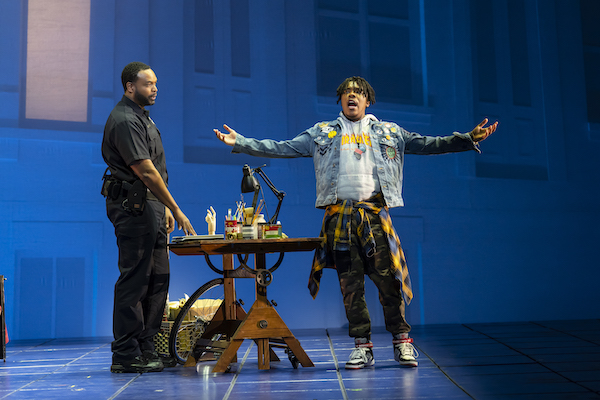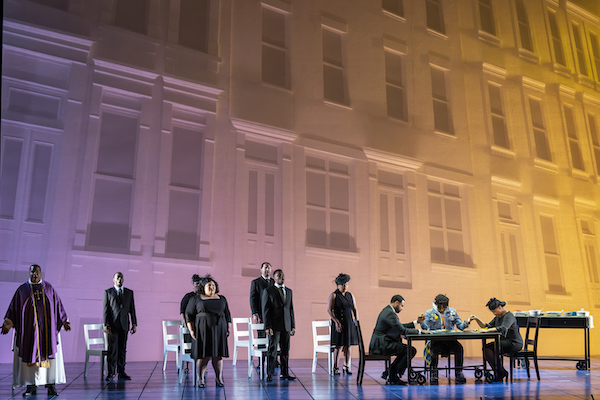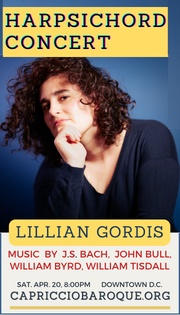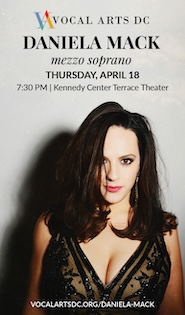Conflicting views of police find harmony in Washington National Opera’s “Blue”

Kenneth Kellogg (left) and Aaron Crouch in Jeanine Tesori’s Blue at Washington National Opera. Photo: Scott Suchman
Washington National Opera had planned to perform Jeanine Tesori’s opera Blue in the spring of 2020, when it became one of the first cultural victims of the coronavirus cancellations. This full-length work, on the first opera libretto written by director and playwright Tazewell Thompson, premiered at the Glimmerglass Festival in 2019. The opera opened in its belated WNO debut Saturday night in the Kennedy Center Eisenhower Theater.
The opera tells the story of a family in Harlem, who must face the unthinkable when their son is murdered by a police officer. Tazewell clothes this story within nuanced context, as the father of this black family is himself a police officer, dressed in the title color. The opera does not present the murdered son as a lurid news story, as the killing takes place between the two acts. We see the young man instead as a hoped-for baby, an energetic boy bounding around, and an angst-ridden teenager, rather than solely as a statistic in an ongoing American tragedy.
Kenneth Kellogg, a D.C. native and long-time presence on local stages, plied his silky, resonant bass to round out the complex character of the Father. With vocal force he railed at his activist son, who has committed a series of petty crimes, and defended his brethren on the police force, reaching down to plangent depths in his confrontation with a priest after the boy’s death. Kellogg also purred with suave legato tone as he held the cherished baby on the day he was born.
Mezzo-soprano Briana Hunter, who distinguished herself some years ago in a small local production, likewise radiated maternal warmth as the Mother. Her aria of explosive grief (“God, give me back any part of my baby”), as she prepared for her son’s funeral at the start of Act II, struck the deepest emotions of the evening. After a punishing funeral scene, where she again found reserves of power, Hunter gave a joyful homage to black cooking in the opera’s epilogue, in which we see the son’s final moments at the dinner table, after the fight with his father that is replayed from Act I and before he goes to his last protest, where he will be shot.
Tenor Aaron Crouch produced a tightly coiled but often underpowered sound as the Son, infusing the character’s anger with teenage bitterness but also finding moments of tenderness. As the Reverend, baritone Joshua Conyers thundered with indignation, his resonant tone softening as he sought a way to comfort the grieving father in their extended scene. (Veteran singer Gordon Hawkins, who was scheduled for the WNO performance in 2020 before it was canceled, sang the role on the recording of the opera WNO released last year on PentaTone.)

Photo: Scott Suchman
Two supporting trios backed up the family, beginning with the three girlfriends who gather with the Mother in the opening scene to celebrate her pregnancy. Middle soprano Katerina Burton and mezzo-soprano Rehanna Thelwell tended to dominate the ensemble with their sassy power (“Damn, girl!”), pushing top soprano Ariana Wehr occasionally into stridency. Wehr, whose high notes have impressed since her apprentice years with WNO, had her best moments as the flighty Nurse at the baby’s birth.
More balanced was the male trio, where first tenor Camron Gray, in a praiseworthy company debut, soared easily on his limpid high notes, supported collegially by second tenor Jonathan Pierce Rhodes and bass-baritone Christian Simmons. While the female trio turned a bit preachy in their scene about the baby (“You havin’ a what?”), the male trio’s joking reaction to the joyous event, set in a sports bar while watching a football game, provided much-needed comic relief in an evening of unrelenting sadness and rage.
Thompson’s fluid, mostly succinct libretto went well with the rather simple style of Tesori’s music. The text combined broad humor with excoriating rage, both from the son, who hates his father for being a cop, and from the father, who berates his son for a history of petty crime. The scene between the Reverend and the father, in particular, bristles with anticlerical sentiment (“Only a white God would sit in his cloudy white heaven”).
Tesori, known principally for film scores and Broadway musicals, has had one work mounted by WNO, the disappointing holiday opera The Lion, the Unicorn, and Me. The harmonic palette of this more recent score is similarly neo-romantic, sometimes bordering on the saccharine, yet there are few memorable melodies. The orchestration is often quite austere, sometimes little more than a stark unison or hovering chords, with some dashes of drum-kit and jazzy syncopation thrown in.
On the other hand, the ensemble writing is quite striking, especially in the funeral scene, where the two trios are combined as a sextet of congregants. Conductor Joseph Young, in a laudable company debut, led with confidence, easily shifting between stylistic genres. Some unusual instrumental effects in the introduction to Act I signaled the tension underlying the story, when the Father, as a young man in a hoodie like the one his son wears later, is confronted by police officers with nightsticks, only to shift character and put on a police uniform.
Thompson, seconded by associate director Cindy C. Oxberry, has mounted a simple but effective staging. Simple set pieces, designed by Donald Eastman, are rolled in front of a projected backdrop showing a block of row houses. The changing colors of Robert Wierzel’s lighting shifted the mood of this stationary backdrop in accordance with the scene. Tazewell’s acute direction deepened the emotions of the opera: its joy, its vehement hatred, and its uplifting hope for healing.
Blue runs through March 25. kennedy-center.org







